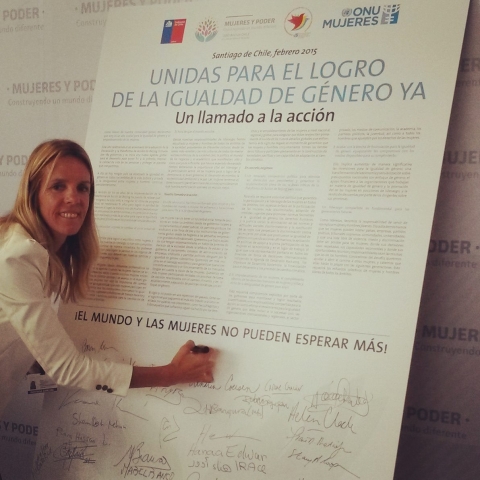Women Leaders call for gender equality
The UN Women summit entitled "Women in Power and Decision-Making: Building a Different World" was held in Santiago de Chile on 27 and 28 February.
Marina Klemensiewicz, head of the Habitat and Inclusion Secretariat at the Ministry of Economic Development within Buenos Aires City Government, was invited to participate on behalf of the METROPOLIS Women International Network.
As the Buenos Aires City Government will host the METROPOLIS Annual Meeting scheduled for 18 to 21 May this year, the work focused strongly on rolling out strategies to put urbanism with a gender perspective on the map in Latin America. The attendees discussed how women can engage in the design of their communities and play an instrumental role in the physical and social transformation of their neighborhoods. Tools were also generated to help establish more antennae in the METROPOLIS Women International Network in the region.
The event in Chile was a great international opportunity to discuss women’s leadership and the role that the METROPOLIS Women International Network plays. Experiences were exchanged on gender mainstreaming in public policies, tools to strengthen women’s presence in areas of power and in pursuit of mobilization and social knowledge regarding gender equality and the civic, political and social empowerment of women.
Marina Klemensiewicz, the METROPOLIS Women’s antennae representative for Buenos Aires, took part in the event along with Michelle Bachelet, President of Chile and former executive director of UN Women, who discussed the challenge facing women in positions of power and the goal of building a different world. Experiences were also exchanged on ways in which women can and must be part of the urban design of their city, neighborhood or community, together with María Isabel Allende, president of the Chilean Senate, and María Antonieta de Saa, regional councilor and Santiago de Chile antennae representative in the METROPOLIS Women International Network.
Gender equality and the empowerment of women are crucial to achieving inclusive development and a more egalitarian society. There is also international consensus on the need to develop public policies that make it possible to overcome women’s scarce representation in decision-making spheres.
The summit round-tables were a debate space for sharing the gender experiences of women who have taken interesting and varied routes to becoming public leaders, the expectations on women in positions of power and strategies for promoting reforms that are gender-sensitive.
Also, in 2014, METROPOLIS agreed to fund the Initiative on Social Habitat Management submitted by the Secretariat of Habitat and Inclusion, which fosters inclusion programs. With the funding received, the idea is to help take this public policy international during 2015 and 2016. Marina Klemensiewicz also had the opportunity to share and explain to the event’s attendeeswhat Social Habitat Management means.
